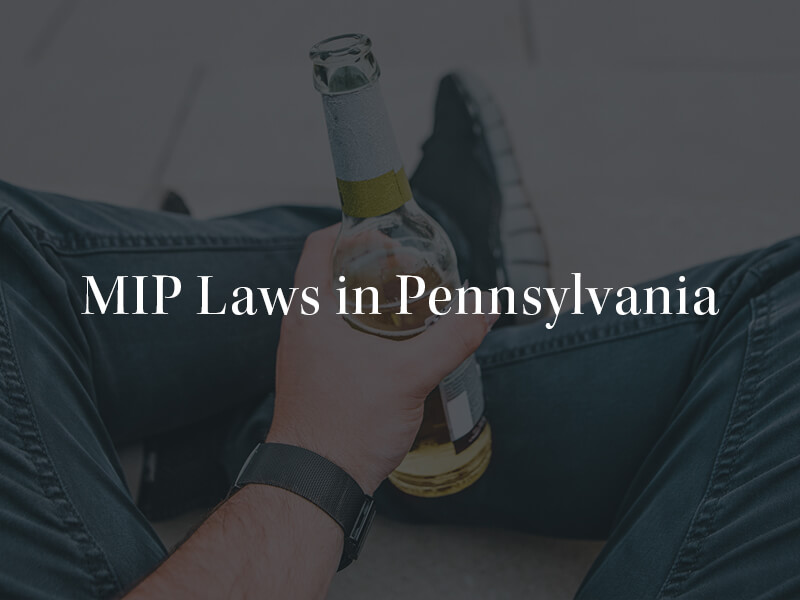Pennsylvania takes underage drinking very seriously. The law in Pennsylvania states that a minor may not purchase (or attempt to purchase), consume, possess, or knowingly and intentionally transport alcoholic beverages.

MIP Law Exemptions
There are six different exemptions to the law prohibiting minors from possessing or consuming alcohol or for minors working in establishments that serve alcohol.
- Employment: A 14- or 15-year old is allowed to work in establishments that sell alcohol, as long as the minor does not serve or handle the alcohol. They cannot enter the room where alcohol is stored. Those aged 16 to 20 may work in areas where minors are allowed. They cannot enter areas where alcohol is served unless the establishment’s food sales account for at least 40% of the total gross sales of food and alcohol combined. Those aged 16 to 20 may serve food but may not serve alcohol. Those over the age of 18 are allowed to work in establishments that distill, brew, and bottle alcohol, as well as places that distribute and deliver alcohol. They can handle and deliver alcohol, but they are not allowed to serve it.
- Entering a licensed establishment with a parent or guardian: A minor may enter an alcohol-selling establishment when they are with their parent or guardian. Minors still may not possess or consume any alcohol.
- Minors over 18; minors who are are unpaid and supervised performing arts students: Minors over 18 may work as paid entertainers in alcohol-selling establishments, though they cannot possess or consume any alcohol. Those who are under 18 may work in an exhibition or performance within an alcohol-selling establishment as long as they are unpaid and under an instructor’s supervision.
- Supervised school and social gatherings: Minors may be a part of social and school gatherings that take place in licensed establishments as long as they are supervised by n adult. The licensee (the person licensed to sell alcohol) must provide written notice of the gathering to the Bureau of Enforcement 48 hours before the event takes place. For social gatherings, each adult may supervise up to 20 minors. For school-sponsored events, each adult may supervise up to 50 minors.
- Medical emergencies: If authorities only became aware of a minor in possession, or a minor consuming alcohol, because the minor called for medical assistance for themselves or someone else, they cannot be charged. The minor must have reasonably believed that they were the first person to call for emergency services, given their own name when they called, and stayed with the person needing assistance.
- Compliance checks. A minor over the age of 18 may buy (or attempt to buy), possess, or transport alcohol if the minor is an officer, employee, or intern with the Pennsylvania State Police Bureau of Liquor Control Enforcement.
Penalties for MIP
The law states that a person convicted of possessing, purchasing, consuming, or transporting alcohol may be sentenced to a fine of up to $500 for the first offense and up to $1,000 for the second and each subsequent offense. In addition, a minor risks the possibility of a license suspension having their license suspended. This is considered a “summary offense,” meaning that the minor is not entitled to a jury trial to determine their guilt. A judge will hear and consider the facts of the case and rule on a punishment.
If a minor is found guilty of misrepresenting their age to buy or consume alcohol, the first offense is a “summary offense” punishable by a fine of up to $500. All subsequent offense could bring misdemeanor charges against the minor.
